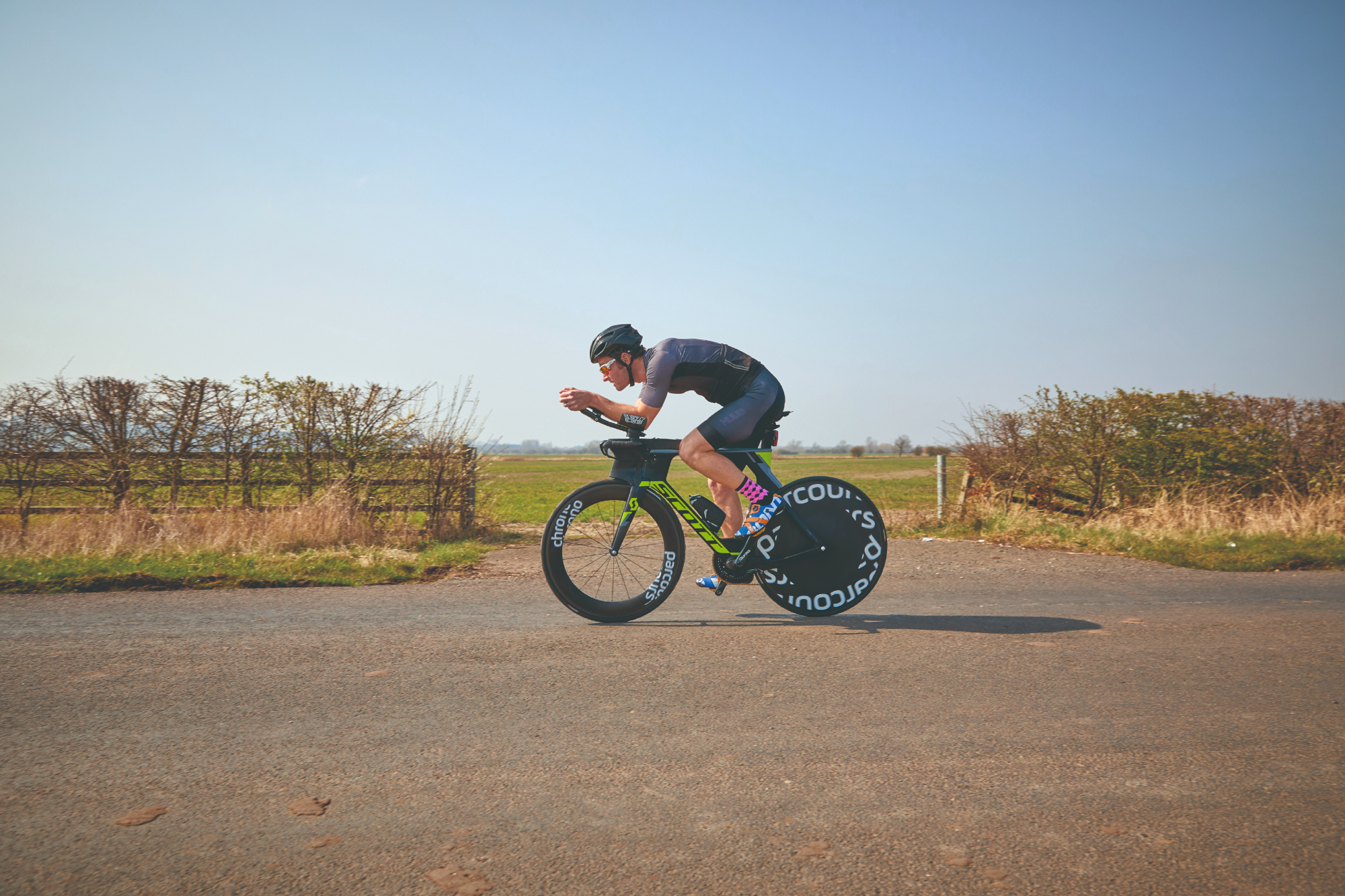
If you’ve ever thought about losing weight and getting leaner, chances are you have been tempted to try intermittent fasting. Advocates claim it can make you lose weight, prevent disease and help you live longer. Its huge popularity has been driven – at least in part – by influencers and celebrities including Rich Roll, Hugh Jackman, Elon Musk and Jennifer Aniston, all of whom attribute their chiselled physiques to the dietary regime.
Gary Lineker recently revealed that he follows a one-meal-a-day diet to keep his weight similar to when he played professional football. But intermittent fasting has also gained a following among cyclists. It is reputed that Bradley Wiggins used fasted training rides to shed weight and improve his body’s ability to burn fat before he won the 2012 Tour de France.
Intermittent fasting is a diet, or a style of eating, whereby you don’t eat for an extended period of time, consolidating all of your meals within a specified eating window. There are several types of intermittent fasting, but the most popular is time-restricted eating (TRE), where you consume all your calories in a prescribed eight-hour (or shorter) window – a much smaller time frame than many people are used to. A popular split is 16:8 where you eat within an eight-hour window and fast for 16 hours. Another variation is the 5:2 diet, which involves eating normally for five days each week and ‘fasting’ on the remaining two days. On each of the two ‘fast’ days, you would typically eat between 500 and 600kcal.
There’s also alternate-day fasting where you fast every other day, keeping your calories under 25% of your usual intake; not eating at all on a rest day; setting an early evening cut-off, after which eating is prohibited; or simply skipping breakfast. It’s easy to see the appeal of intermittent fasting as a weight loss method. Not only is it simple, it’s also relatively easy to sustain and doesn’t require you to eliminate foods or count calories. Many believe this approach more closely mimics the eating patterns of our hunter-gatherer ancestors, who frequently had to go without food for extended periods of time. But does this mean intermittent fasting is beneficial for modern-day cyclists?
How intermittent fasting helps with weight loss for cyclists

By far the biggest motivator for embarking on intermittent fasting is weight loss. The idea behind it is that during fasting glycogen reserves decrease rapidly. To meet your body’s energy demands, you begin to burn more fat. A meta-analysis published in 2021 showed that intermittent fasting combined with resistance training can lead to a reduction in body weight and body fat percentage without losing muscle mass. An eight-week study looked at the effect of a time-restricted eating protocol (20- hour fasting, four-hour eating, or 20:4) done four days a week by young, recreationally active, male participants in combination with resistance training. The time-restricted eating group lost weight due to a lower calorie intake on fasting days but did not lose muscle mass or strength.
However, these body composition changes do not always improve cycling performance. A 2020 study of elite cyclists showed that aerobic capacity, measured by a VO2 max test and performance in an endurance test remained unchanged after intermittent fasting over a four-week training period. While the cyclists lost weight, they did not gain a performance benefit. It is worth noting that this study was carried out during the winter non-competitive season and therefore most of their training consisted of long rides at a low or medium pace. Whether the results would be different during the racing season or a more intense training period is not known.
Muslim cyclists report increased fatigue and muscle soreness during Ramadan (which involves approximately one month of complete fasting from sunrise to sunset), but this may be partly due to dehydration, since fluids are also restricted during this period. Unsurprisingly, significant weight loss occurs, the downside being that this includes a reduction in lean mass as well as fat mass.
We know that weight loss occurs when the body is in calorie deficit, but does intermittent fasting help you achieve this goal more easily than other regimens? To answer this question, Australian researchers compared the effects of intermittent fasting to daily caloric restriction on body weight, body composition, and other clinical parameters. Their review included 40 studies in total. They found that, overall, the two diet types resulted in equivalent outcomes in terms of weight loss, fat loss and insulin sensitivity (how effectively the body regulates blood sugar). Intermittent fasting was sometimes better for reducing appetite but, on the whole, it failed to result in superior improvements in body composition or greater weight loss compared to daily caloric restriction.
According to the position stand of the International Society of Sports Nutrition, published in 2017, time-restricted eating has no significant advantage over daily calorie restriction, i.e. simply cutting back. This view is supported by Renee McGregor, a leading sports and eating disorder specialist dietitian.
“There is little evidence to suggest intermittent fasting is any better than other approaches, but even less evidence that it can support those who are physically active,” says McGregor, author of More Fuel You: Understanding your Body and How to Fuel your Adventures. “Whether you are doing the 16:8, 12:12 or 5:2, they are still based on the formula of creating an energy deficit. Intermittent fasting reduces the time for eating, which makes it harder to eat as much as you normally would, so you end up reducing your calorie intake spontaneously.”
Are there other intermittent fasting benefits?

While intermittent fasting might not be a miracle solution when it comes to weight loss, what about the other health benefits it is claimed to have? Scheduling your mealtimes and your bedtime could help regulate your circadian rhythms across the board, which may in turn help to regulate stress levels and overall health. A 2022 review on intermittent fasting found that it improved blood pressure and insulin sensitivity, and lowered cholesterol levels to a similar extent as daily calorie restriction. A recent study involving men with a high risk of diabetes looked at the effects of restricting eating to a six-hour window. The researchers found that this improved several markers of health such as insulin sensitivity, which is a risk factor for type-2 diabetes.
What are the risks with intermittent fasting?
1. Under-fuelling risks
Intermittent fasting may result in an energy deficiency that is too great for cyclists with high energy needs. If the deficit is prolonged, this will have an adverse effect on health and performance. None of the cycling coaches I spoke to while researching this feature said they recommend intermittent fasting. The main drawbacks mentioned were hunger, physical tiredness and the need for plentiful energy during periods of high training volume, when increased fuel and nutrient intake is essential for optimal performance and recovery.
“If you start out a hard training session or race with low glycogen stores in your muscles, your performance can suffer,” says performance cycling coach Holly Seear (hollyseear.com). “I don’t recommend any type of fasting for my cyclists during an intense training block. There is a risk you could end up under-fuelled, which would compromise your training quality and performance.”
Studies show that intermittent fasting can reduce the amount of physical activity you do, and impair performance during exercise. Researchers at Loughborough University measured exercise performance in a 30-minute time trial at 5pm, with or without breakfast. The participants had eaten as much as they wanted for lunch, but this wasn’t enough to make up the deficit. Time trial performance was 4.5% worse after skipping breakfast. This suggests that when calorie intake is substantially reduced – even for a short period of time – the body adapts by reducing the number of calories used during exercise.

“Nutrition is integral to both health and performance,” explains McGregor. “In order to get the most out of your training, it is important to ensure you fuel appropriately; that means fuelling well before, potentially during, depending on how long your ride is, and then also soon afterwards for recovery.
“This process allows for the hormonal cascade – needed not just for progression in your performance, but also to ensure that you prevent metabolic injury which in the long run can lead to the body downregulating and preserving energy, making weight loss even more difficult.”
2. Dysfunctional eating
Could intermittent fasting lead to eating disorder behaviours? A recent study involving 2,762 Canadian adolescents and young adults showed a significant association between intermittent fasting in the past 12 months and eating disorder behaviours, such as overeating, compulsive exercise, vomiting and laxative use. Although this study does not determine whether it was fasting causing eating disorders or the other way around, eating disorders leading to fasting, it does highlight a troubling correlation.
“There is a real concern that in individuals who are susceptible to developing dysfunctional eating behaviours, these large periods of time of no eating may then lead to periods of time of eating to excess, resulting in difficult thoughts and emotions, which then set the scene for more restrictive behaviours and the start of binge-purge-restrict cycle,” adds McGregor.
Fasting and the female body

Very few fasting studies have been carried out on women. According to Dr Stacey Simms, exercise physiologist and author of post-menopause training guide Next Level, intermittent fasting is not a good idea for women, especially those who exercise regularly: “As a woman, your body will fight to preserve energy when you start fasting. When your brain perceives nutrient deficiency, especially a deficiency of carbohydrates, there is a marked reduction in kisspeptin [a neuropeptide] stimulation, which not only increases your appetite but also reduces your sensitivity to insulin. This is why research shows intermittent fasting is more likely to cause impaired glucose control in women than in men.”
A study published in Obesity Research compared eight men and eight women who followed an alternate-day fasting regimen for three weeks showed improved insulin sensitivity in men, but worsened blood sugar control in women. There are also a number of anecdotal reports of women who have experienced changes to their menstrual cycle, or have stopped having periods altogether after starting intermittent fasting. According to Simms, if you exercise while fasting, it creates a double whammy of stress, raising cortisol levels and depressing thyroid activity, both of which disrupt the menstrual cycle.
Coach’s view - ‘Don’t shut off the energy tap!’
Cycling S&C coach Chris Peden is sceptical about time-restricted eating for anyone who is training hard:
"Time-restricted feeding – or intermittent fasting as it’s more commonly known – is often marketed as a magical solution to all of your health and performance goals. Limiting the time window when you’re allowed to eat definitely does suit some people’s lifestyles – especially for those who tend not to feel hungry first thing in the morning. It makes sense to start eating only once you feel ready. For those looking to lose some weight to improve their health, it’s therefore a simple and suitable strategy to help reduce overall caloric intake.
"However, for cyclists with performance in mind, in my view it is rarely a suitable strategy. Supporting training and recovery requires a lot of energy day after day. By restricting your opportunities to eat, you are making it harder to meet both your total daily energy and protein demands that your body needs to optimally perform and recover. In the long term, this may have negative consequences.
"The quality of your training and ability to perform at a high level may be limited. Fasted training can have its benefits but must be timed very carefully. Finally, research has shown that skipping breakfast can harm athletic performance later in the day, even when the overall energy and macronutrient profile are identical."
Case study: ‘It works for me’
James Turner, 47, a cyclist and IT manager from Chobham, Surrey, uses intermittent fasting in preparation for the racing season:
"I practise intermittent fasting mainly to get down to my race weight pre-season and manage my weight during race season. Generally, my off-season weight is 80kg and my race weight is 75-76kg. I find that doing an extended overnight fast followed by a fasted ride twice a week is enough to achieve my weight goal, which, in turn, benefits my performance in races.
"I train 10 hours a week on the bike as part of my training programme. On fasting days, I skip breakfast then cycle 45km to work. Once I get to the office, I’ll forgo food, then eat lunch around midday, which represents roughly a 16-hour fast.
"On my fasted rides, I listen to my body to ensure I don’t push too hard but I can usually maintain threshold intensity. If I feel too fatigued, then I’ll skip training and take the train instead. I find fasting is a good way to condition my body to perform in the absence of readily available energy – a sort of rehearsal for race conditions.
"Intermittent fasting works for me as I’m ageing. It means I don’t struggle with my weight like some cyclists do. I can enjoy a drink in the evening, go to the pub with friends. Without these restrictions, my weight increases. I’m aware that cyclists can reduce muscle mass if they fast, so I make sure I eat enough and keep to a balanced cycling training plan."
The verdict

Intermittent fasting is essentially a tool to restrict calories and manage hunger, which can ultimately drive weight loss. But it’s not a magic fat loss solution nor a quick-fix solution. It may have health benefits for the general population, but these do not necessarily translate to becoming a better cyclist, especially if you are training multiple times a day or doing frequent long, hard rides.
There is a very real danger that the restricted eating schedule may compromise your performance and recovery. The potential downsides – more limitations around when you can train hard and an increased risk of under fuelling – likely outweigh the rewards. If you have a history of disordered eating or an unhealthy relationship with food, then intermittent fasting is most certainly not for you. Finally, the potential impact of intermittent fasting on social interactions must also be considered – who wants to forgo the cake at the cafe stop? For most of us, there are better, more sustainable ways of losing or controlling weight.
This full version of this article was published in the print edition of Cycling Weekly. Subscribe online and get the magazine delivered direct to your door every week.







